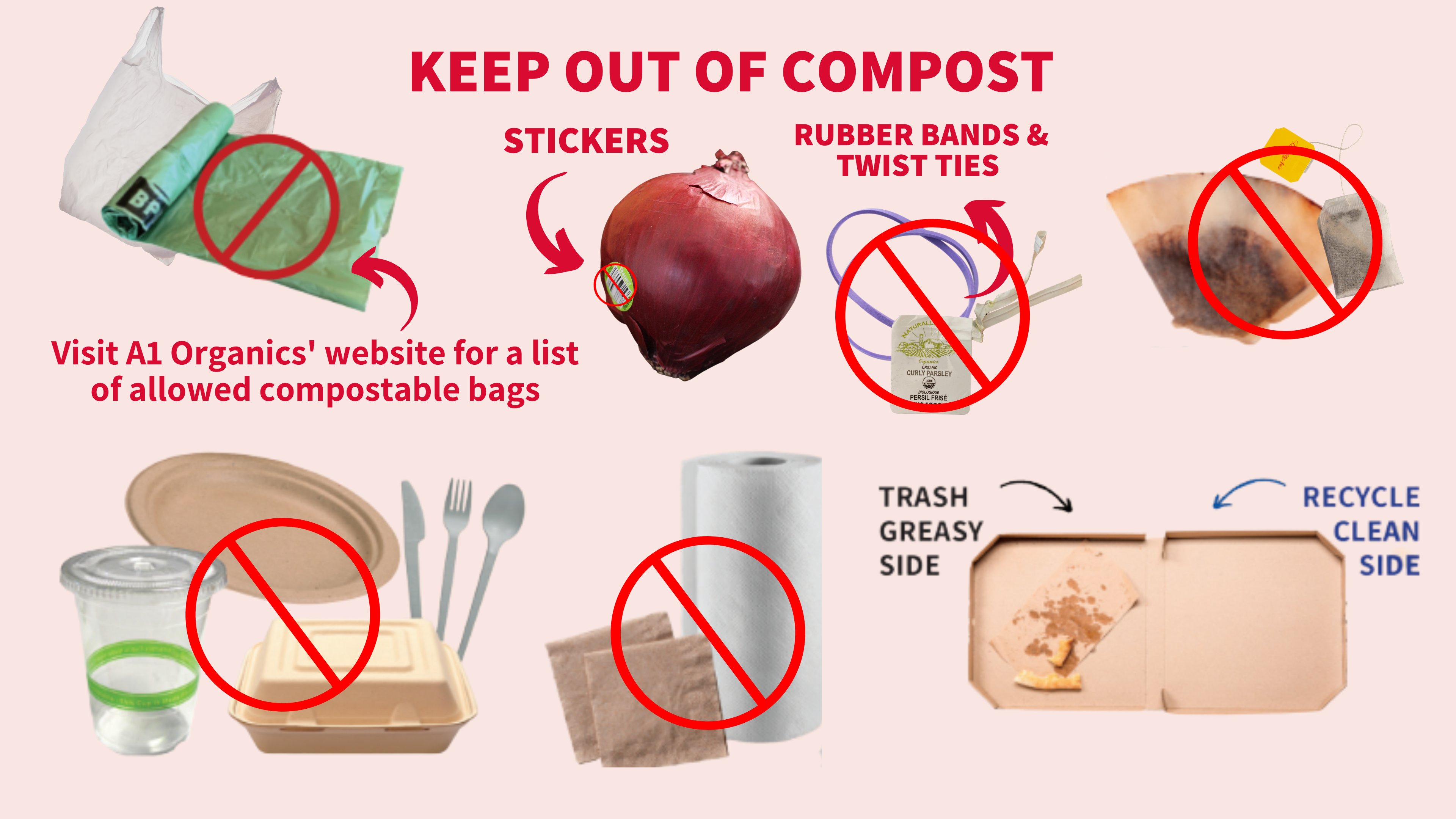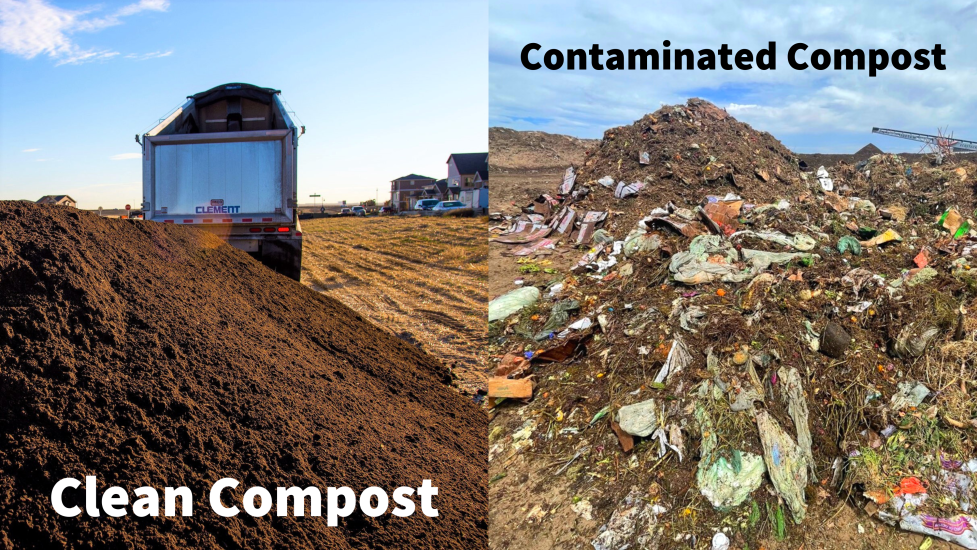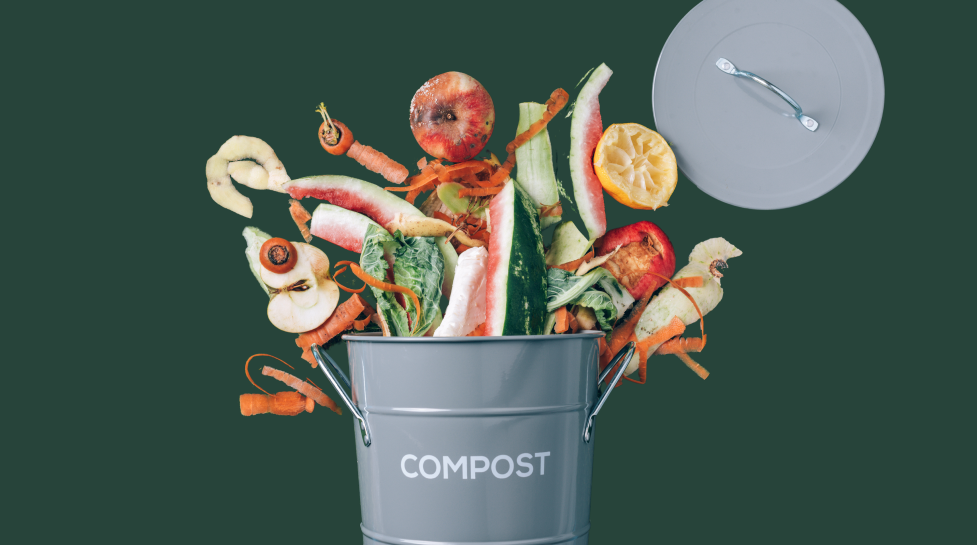We need your help creating healthy compost. Please know before you throw.
Compost Rules Have Changed
Only food scraps, plants and yard trimmings are accepted in compost bins.
By composting the right way, we can keep contamination out of the bin, create clean, usable compost, and help nourish healthy soils that grow fresh, local food for our community.
🚨 Compost Food Scraps, Plants and Yard Trimmings.

1. All food scraps
- Including meat, bones, dairy, coffee grounds and eggshells.
2. Plant and yard trimmings.
- Leaves, twigs, flowers, grass and other yard trimmings.
If it was on your plate or grew in your yard, it goes in your compost bin.
Keep these out of the compost bin – they belong in the trash:
- Compostable packaging and products, including certified compostable cups, utensils, plates and to-go containers. Do not recycle these products.
- Paper products, like towels, napkins and shredded paper. These can still be added to your backyard compost bin.
- Coffee filters and tea bags. Dump coffee grounds and tea leaves into your compost bin and trash the filter or bag.
- Stickers, rubber bands and twist ties.
- Diapers and menstrual products.
- Many bags are not allowed. Keep plastic bags out. Check out A1 Organics' website for a list of allowed compostable bags.
What about lawn and leaf bags?
Many waste haulers are still collecting large, brown paper bags used for yard trimmings. These bags must be left next to your compost bin. Please check with your waste hauler for more information.
Large yard trimmings, like branches, can be taken to Western Disposal’s Yard Waste Drop-Off Center for a reduced fee.
Got bag questions?
Reach out to your waste hauler for more information.

Please sort mindfully to prevent contamination. Contact your waste hauler to learn more about sorting and potential contamination fees.
Skip the bag and save money. Use an unlined kitchen compost bin.
You don’t need to bag your compost. Go bag free and simply rinse out your indoor compost container. If it gets stinky, give it a quick rinse and pour the water directly onto your yard or trees.

Have More Questions?
Check out our Compost Rules FAQ.
We need your help creating healthy compost.
Contaminants – from glass to diapers – are ending up at our local compost manufacturer. When processed with our organic waste, pieces of these pollutants make their way into soils and waterways and eventually turn up in our food and water.

To protect the quality of finished compost, truckloads of contaminated compostable materials are being rejected and sent to the landfill. There, organic material is unable to break down and produces methane, a powerful greenhouse gas that fuels the climate crisis.
Help keep food scraps and plants out of the landfill by knowing what belongs in the bin before you throw. Doing so will also help make clean, healthy compost that we're proud to put on our gardens.
Your compost bin is a soil maker. What goes in it turns into healthy soils and food.
The composting process gives organic matter a new life, turning carrot tops and coffee grounds into a nutrient-rich material that nourishes our soils. Compost increases our soil’s ability to absorb and hold water. It also promotes a diversity of soil life which remove and store carbon dioxide – the most common greenhouse gas – from the atmosphere. However, these benefits depend on the quality of our community’s compost.

Spread the word! Teach others to compost right.
Share this article with friends and family and help them learn what belongs in the compost. We need everyone on board to beat contamination.
When in doubt, look it up.
Consult Eco-Cycle's A-Z Recycling Guide for hundreds of common waste items and where they belong. There's also an app version for your smartphone.
Not sure and in a rush? Throw it out.
It feels good to compost as much as possible, but adding non-compostable materials to a compost bin can result in the whole thing ending up in the landfill. Do your research now so you know how to sort when on the go.
Let's Create a Culture of Reuse
Long term, a shift toward circularity and reusable products is needed to address many of the climate and waste management challenges we face today. This growing movement goes beyond recycling and composting to focus on preventing waste in the first place. It also explores innovative ways to curb Boulder’s collective consumption through reuse and repair.
Explore our Circular Boulder guide to learn more.
Want to help? Switch to reusables!
Here are some swaps to help you get started:
- Use cloth napkins and towels instead of paper products.
- Bring a reusable mug, cup or thermos to coffee shops.
- Carry a reusable water bottle, shopping bag, straw and set of utensils with you. Keep these items in your backpack, bike bag or car for easy access on the go.
